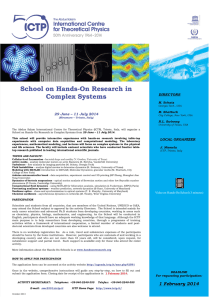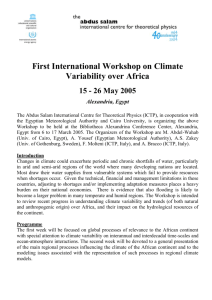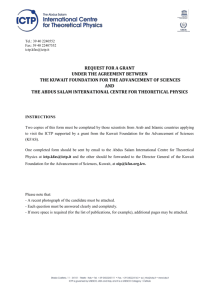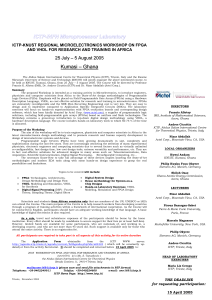I T U D
advertisement
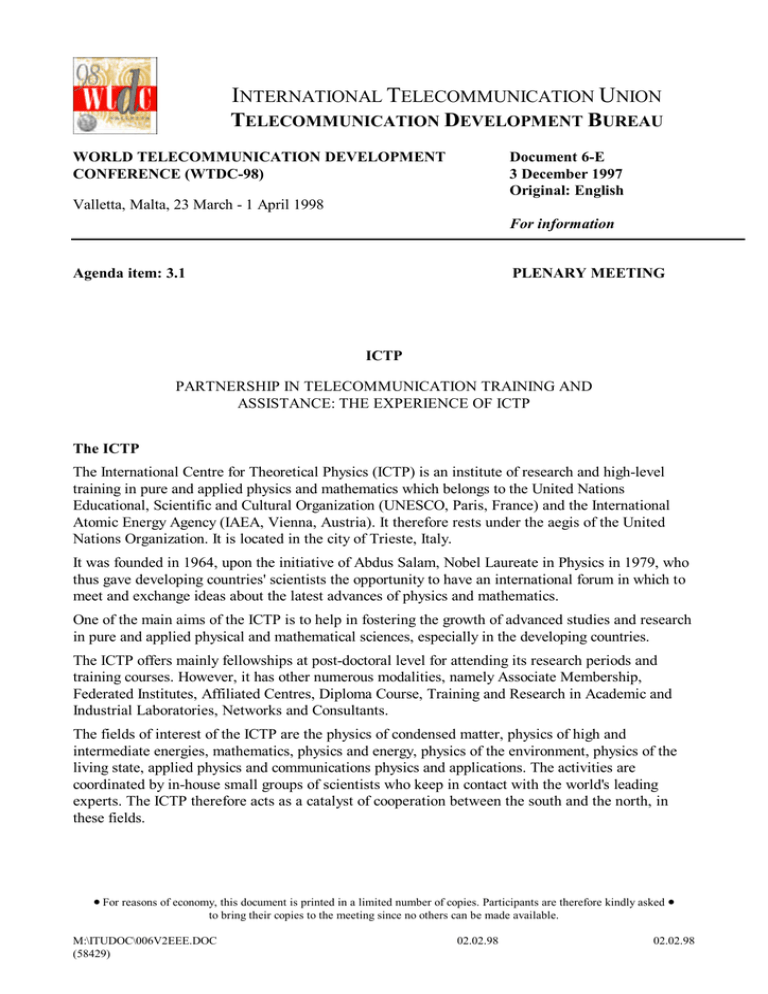
I NTERNATIONAL TELECOMMUNICATION UNION TELECOMMUNICATION DEVELOPMENT BUREAU Document 6-E 3 December 1997 Original: English WORLD TELECOMMUNICATION DEVELOPMENT CONFERENCE (WTDC-98) Valletta, Malta, 23 March - 1 April 1998 For information Agenda item: 3.1 PLENARY MEETING ICTP PARTNERSHIP IN TELECOMMUNICATION TRAINING AND ASSISTANCE: THE EXPERIENCE OF ICTP The ICTP The International Centre for Theoretical Physics (ICTP) is an institute of research and high-level training in pure and applied physics and mathematics which belongs to the United Nations Educational, Scientific and Cultural Organization (UNESCO, Paris, France) and the International Atomic Energy Agency (IAEA, Vienna, Austria). It therefore rests under the aegis of the United Nations Organization. It is located in the city of Trieste, Italy. It was founded in 1964, upon the initiative of Abdus Salam, Nobel Laureate in Physics in 1979, who thus gave developing countries' scientists the opportunity to have an international forum in which to meet and exchange ideas about the latest advances of physics and mathematics. One of the main aims of the ICTP is to help in fostering the growth of advanced studies and research in pure and applied physical and mathematical sciences, especially in the developing countries. The ICTP offers mainly fellowships at post-doctoral level for attending its research periods and training courses. However, it has other numerous modalities, namely Associate Membership, Federated Institutes, Affiliated Centres, Diploma Course, Training and Research in Academic and Industrial Laboratories, Networks and Consultants. The fields of interest of the ICTP are the physics of condensed matter, physics of high and intermediate energies, mathematics, physics and energy, physics of the environment, physics of the living state, applied physics and communications physics and applications. The activities are coordinated by in-house small groups of scientists who keep in contact with the world's leading experts. The ICTP therefore acts as a catalyst of cooperation between the south and the north, in these fields. •For reasons of economy, this document is printed in a limited number of copies. Participants are therefore kindly asked • to bring their copies to the meeting since no others can be made available. M:\ITUDOC\006V2EEE.DOC (58429) 02.02.98 02.02.98 -2CMDT98/6-E About 4 000 scientists visit the ICTP every year. During more than 30 years of operation, the ICTP has welcomed scientists from over 150 nations, for a total of 60 000 visits. Professor Abdus Salam retired from the Directorship in 1993 and has been President of the institution since. The current Director is Professor Miguel Angel Virasoro (Argentina/Italy). The ICTP and telecommunications The importance of telecommunications for the social and economic development of a country and its relevance in closing the gap between developed and developing countries is well recognized. Radiocommunications, in particular, represent a possible "leap-frog" solution for several communication problems in developing countries. The building up of the Global Information Infrastructure poses the challenge of providing developing countries with an adequate way to be linked with the rest of the world to avoid the risk of being cut out from main stream of information flow. To this end, computer networks of different shades of complexity and technologies must be built, operated and maintained. The academic community is the obvious starting point for these efforts that will permeate to the rest of society. The underlying problem is the lack of sufficient well qualified human resources able to handle new systems and technologies as recognized by the Additional Plenipotentiary Conference of ITU held in Geneva during December 1992. The above premises motivated the International Centre for Theoretical Physics of Trieste to start back in 1989 training activities in the fields of telecommunications, radiocommunications and computer networking. In 1993 a Memorandum of Understanding was signed by the ITU, URSI and ICTP to fix a frame of reference for the collaboration towards the advancement of human resources and research and development capability in the field of telecommunication, science and technology in developing countries. The cooperation involves joint training activities, measurements campaigns and research projects oriented toward the solution of telecommunication problems of developing countries. In 1990 was launched the ICTP bi-regional African-Latin American Network of Radiopropagation Groups, with the participation of research and development units of Argentina, Brazil and Nigeria. The Network has shown its ability to coordinate scientific and technological interregional efforts of interest to telecommunications. The results of such efforts have been presented at the bi-regional conferences which takes place every two years with ICTP and URSI sponsorship and financial support. Since 1995 these conferences have concentrated their interest on the African continent under the name of Radio Africa conferences. The first one was held in Ile-Ife, Nigeria, in 1995 and the second one in 1997, in Nairobi, Kenya. At present several international and national organizations are supporting these conferences. A series of Workshops on Telematics, organized under the direction of a former Director of the Indian Centre for the Development of Telematics (C-DOT), and with the cooperation of CSELT (Italy), have also been carried out to cover the fundamentals of digital communication technology. The last edition of the Workshop extended its objectives to cover techniques like ATM and B-ISDN. The role of computers as a powerful communications tool has been emphasized in 1990 with the First International School on Computer Network Analysis and Management conducted as a means of fostering the establishing of computer networks in developing countries. One of the issues recognized early was that the limitations of the local telecommunications infrastructure is a big M:\ITUDOC\006V2EEE.DOC (58429) 02.02.98 02.02.98 -3CMDT98/6-E hurdle to the implementation of computer networks. Radio emerged as a technology that could help overcome those limitations. When the second International Activity on Computer Networking was held at ICTP in 1992, radio techniques and protocols that made it feasible to link computers without cables were examined. Participants from Venezuela were able to capitalize on these experiences to establish the first Latin American Networking School that was held at Universidad de los Andes in November 1992, with strong support from ICTP. Radio techniques were again emphasized, with hands-on experiments, which led to the establishing of a working group on these technologies with participants from Africa, America and Asia, coordinated through the ICTP. In 1995 a team with participants from Nigeria, the Philippines and Venezuela was assembled at ICTP in order to assess the technological alternatives for the establishment of a radio computer network at the University of Ile-Ife in Nigeria. In November of the same year, the second Latin American Networking School was held at Universidad de los Andes with financial contributions from ICTP and the Organization of American States, which led to the training of 110 participants from 10 countries of the region. The training activities carried out by the ICTP between 1989 and 1997 in fields related to telecommunication are given in Table 1 with the duration and number of participants. Lecturers were leading experts coming mostly from developed countries and international organizations. Several of these activities were organized and co-sponsored with the International Union of Radio Science (URSI ) and the International Telecommunication Union - Telecommunication Development Bureau and with the United Nations University. A new programme The experience gained during several years has moved ICTP to establish a Programme of Training and System development on Networking and Radiocommunications which was started in 1996 with the collaboration of the United Nations University (UNU). The objective of the programme is to provide technical assistance and training to academic and scientific institutions in developing countries requesting help to establish: 1) small area computer networks and their connection to the Internet, either directly or through national networks; 2) data communication services in rural or remote areas. A training laboratory was established in 1996 at ICTP also thanks to a generous contribution received from Swiss Telecom who donated several electronic instruments and a number of radiolinks which are being used both for training and pilot projects. The projects carried out by the programme are: Nigeria 1) A pilot project, aimed at the establishment of a computer network for education and research at the Obafemi Awolowo University of Ile-Ife, was started and successfully completed by June 1996. Such a network that uses spread-spectrum radio-links provides access to international information networks necessary for the promotion of science and technology in the University. 2) A project for the National Universities Network (NUNet) of the National Universities Commission of Nigeria with the World Bank financial support. The objective was the training, at ICTP's Headquarters in Trieste, Italy, 26 academic network managers and M:\ITUDOC\006V2EEE.DOC (58429) 02.02.98 02.02.98 -4CMDT98/6-E 16 network engineers representing 26 Nigerian universities. The activity was successfully completed in December 1996. 3) As a follow up to this activity a new one entitled "Academic Networking Technology Workshop - NUNet Capacity" took place in Ile-Ife and Abuja, in Nigeria, from 6 to 27 October 1997 with staff from all the 40 Nigerian universities as participants. At the same time operation of NUNet was officially started. 4) A project was carried out successfully at the Bayero University in Kano in June 1997 to upgrade the local area network and to link by a spread-spectrum radio-link the two campuses of the University placed a few kilometres apart from one another. Ghana 1) A four-month training activity was carried out at the ICTP from August to December 1997. The activity was aimed to train one representative each from two Ghanaian Institutions: the University of Cape Coast and the Council for Scientific and Industrial Research (CSIR), Accra. 2) The two Ghanaians trained at the ICTP will act as instructors at the "Workshop on the Use of Radio for Computer Networking". This activity will be held in Ghana in August 1998 cosponsored by ICTP, UNU, the University of Cape Coast and the Ghanaian CSIR with the participation of 25 engineers from West Africa. Romania 1) A pilot project for the establishment of a full Internet Connectivity between the National Institute for Material Physics located at the Magurele Physics Platform and the node of the Polytechnic University of Bucharest has been successfully carried out during July 1997. 2) A CD-ROM based course on Computer Networking Techniques and Management (including the use of radio-links) was being prepared between September and December 1997 for the Project Educo-University of Bucharest financed by the World Bank. This activity was done in the framework of the Department for Open Distance Learning of that University. Future projects In addition to continue the intensive collaboration with Nigeria, Ghana and Romania new endeavours in Morocco, Côte d'Ivoire, Cameroon, Malawi, Kenya and the Democratic Republic of Congo (former Zaire) are foreseen. A scheme of technical partnership In order to build up an extensive collaborative system of trained personnel in well established institutions, the Programme of Training and System development on Networking and Radiocommunications have established an innovative scheme of TECHNICAL PARTNERSHIP. Different institutions located in different areas of the world are linked by this partnership in the common interest of providing technical assistance and training to academic and scientific institutions in developing countries. Each partner contributes its own expertise. The institutions that are at present involved in the partnership and their specific tasks are indicated in Figure 1. M:\ITUDOC\006V2EEE.DOC (58429) 02.02.98 02.02.98 -5CMDT98/6-E It must be noted that the partnership is done through simple Memoranda of Understanding between the ICTP and the institutional partner. The actual work is done by a core group of experts in the different institutions that maintain a continuous flow of information and collaborate among them. The ICTP Programme of Training and System development on Networking and Radiocommunications is always seeking organizations who would like to be partners of the Centre to further support developing countries academic and scientific institutions interested in the development of computer communications capability to facilitate their participation in the Global Information Infrastructure. FIGURE 1 A diagram showing the Technical Partnership scheme adopted by the ICTP Programme of Training and System development on Networking and Radiocommunications M:\ITUDOC\006V2EEE.DOC (58429) 02.02.98 02.02.98 -6CMDT98/6-E TABLE 1 ICTP activities in Telecommunications and Computer Networking Year Duration Title of activity Breakdown of participation and lecturers by geographical area Africa Asia Europe Oceania North Central South America America America Int. Org Total College on theoretical and experimental radiopropagation physics 1989 3 weeks 19 24 22 1 0 3 19 0 88 Course on basic telecommunications science 1989 3 weeks 21 33 13 2 0 3 12 1 85 Second Workshop on telematics 1989 3 weeks 16 49 8 0 0 5 13 1 92 First International School on computer network analysis and management 1990 2 weeks 0 3 56 0 0 1 2 2 64 Second college on theoretical and experimental radiopropagation physics 1991 3 weeks 17 25 17 1 0 0 8 0 68 Computer network project 1992 2 weeks 7 6 61 0 0 2 6 4 86 Seminar on radiowave propagation in tropical regions* 1993 1 week 21 2 8 0 0 1 4 0 36 Third ICTP-URSI college on theoretical and experimental radiopropagation physics* 1993 4 weeks 10 20 13 1 0 0 10 0 54 Workshop on scientific aspects of the rural communications in developing countries* 1993 1 week 12 21 4 1 0 1 10 0 49 Workshop on telematics 1993 3 weeks 7 34 22 0 0 4 7 0 74 Follow-up to the workshop on preparation of radiomaritime master plans for English speaking African countries* 1994 1 week 19 0 5 0 0 0 1 0 25 Suivi de l'atelier sur la préparation des plans directeurs radio-maritime 1994 pour les pays africains francophones 1 week 26 0 8 0 0 0 1 0 35 Fourth ICTP-URSI-ITU (BDT) College on radiopropagation: propagation, informatics and radiocommunications system planning* 1995 5 weeks 13 15 19 2 0 2 3 0 54 Workshop on telematics** 1995 3 weeks 12 29 17 0 0 6 4 1 69 M:\ITUDOC\006V2EEE.DOC (58429) 02.02.98 02.02.98 -7CMDT98/6-E First Bolivian course on computerized data acquisition techniques (La Paz, Bolivia)** 1995 2 weeks 0 1 1 0 0 0 56 0 58 Second workshop on rural communications in developing countries* 1995 1 week 14 16 15 1 0 2 3 0 51 Seminaire sur le système de signalisation CCITT No. 7 à'lintention des pays francophones* 1995 1 week 22 0 4 0 0 0 1 0 27 Second Latin American networking School (Merida, Venezuela) 1995 2 weeks 0 0 0 0 0 20 90 0 110 ICTP-ITU (BDT) Workshop on economic quantification of the impact 1996 of telecommunication in development 1 week 9 6 7 0 0 3 3 2 30 Seminar on Signalling System No. 7 for English speaking African countries 1996 1 week 17 1 3 0 0 0 1 0 22 Project on NUNet Capacity Building 1996 1 month 42 1 7 0 2 0 6 0 58 ICTP-URSI-ITU-BDT workshop on the use of radio for digital communications in Developing Countries 1997^ 2 weeks 14 6 16 0 0 1 5 0 42 Second Latin American course on data acquisition and data filtering** 1997^ (S. Louis, Argentina) 4 weeks 0 0 2 0 0 3 27 0 32 Workshop on telecommunications: Science, technology and applications** 3 weeks 27 29 22 0 9 0 7 0 94 345 321 350 9 11 57 299 11 1 403 1997^ GRAND TOTAL * Received financial support from ITU/BDT (International Telecommunication Union- Geneva, Switzerland). ** Co-Sponsored by UNU (United Nations University- Tokyo, Japan). _____________ M:\ITUDOC\006V2EEE.DOC (58429) 02.02.98 02.02.98

